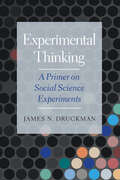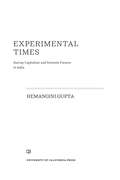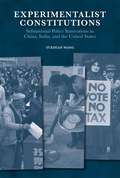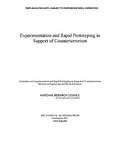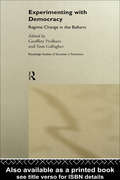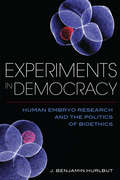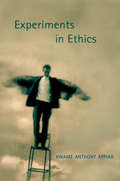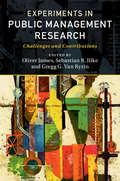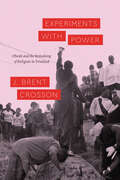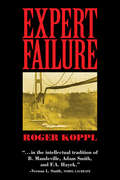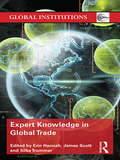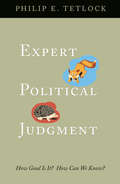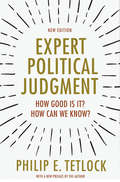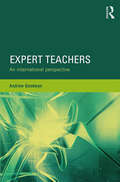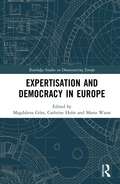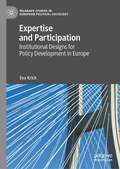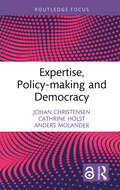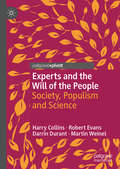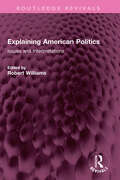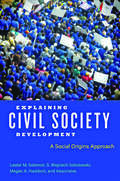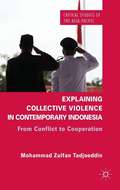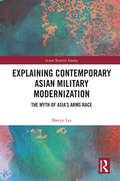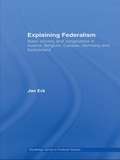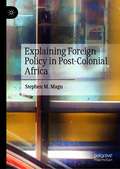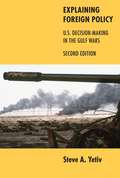- Table View
- List View
Experimental Thinking: A Primer on Social Science Experiments
by James N. Druckman Donald GreenExperimental political science has changed. In two short decades, it evolved from an emergent method to an accepted method to a primary method. The challenge now is to ensure that experimentalists design sound studies and implement them in ways that illuminate cause and effect. Ethical boundaries must also be respected, results interpreted in a transparent manner, and data and research materials must be shared to ensure others can build on what has been learned. This book explores the application of new designs; the introduction of novel data sources, measurement approaches, and statistical methods; the use of experiments in more areas; and discipline-wide discussions about the robustness, generalizability, and ethics of experiments in political science. By exploring these novel opportunities while also highlighting the concomitant challenges, this volume enables scholars and practitioners to conduct high-quality experiments that will make key contributions to knowledge.
Experimental Times: Startup Capitalism and Feminist Futures in India
by Dr. Hemangini GuptaExperimental Times is an in-depth ethnography of the transformation of Bengaluru/Bangalore from a site of "backend" IT work to an aspirational global city of enterprise and innovation. The book journeys alongside the migrant workers, technologists, and entrepreneurs who shape and survive the dreams of a "Startup India" knitted through office work, at networking meetings and urban festivals, and across sites of leisure in the city. Tracking techno-futures that involve automation and impending precarity, Hemangini Gupta details the everyday forms of experimentation, care, and friendship that sustain and reproduce life and labor in India's current economy.
Experimentalist Constitutions: Subnational Policy Innovations in China, India, and the United States (Harvard East Asian Monographs #472)
by Yueduan WangOne of the most commonly cited virtues of American federalism is its “laboratories of democracy”—the notion that decentralization and political competition encourage states to become testing grounds for novel social policies and ideas. In Experimentalist Constitutions, the first book that systematically compares subnational experimentalism in different countries, Yueduan Wang argues that the idea of federal laboratories is not exclusive to the American system; instead, similar concepts can be applied to constitutions with different center-local structures and levels of political competition. Using case studies from China, India, and the United States, the book illustrates that these vastly different polities have instituted their own mechanisms of subnational experimentalism based on the interactions between each country’s constitutional system and partisan/factional dynamics. In this study, Wang compares and contrasts these three versions of policy laboratories and comments on their pros and cons, thus contributing to the discussion of these great powers’ competing models of development.
Experimentation and Rapid Prototyping in Support of Counterterrorism
by National Research Council of the National AcademiesThe U.S. military forces currently face a nontraditional threat from insurgents and terrorists who primarily employ improvised explosive devices, and have shown a cycle of adaptation of less than 12 months to responses by U.S. forces to counter these attacks. This constantly evolving threat requires U.S. military forces to adapt and respond more rapidly with modified tactics, technologies, and/or equipment. In response to this need for new technologies, the Rapid Reaction Technology Office (RRTO) was established in 2006 to develop technologies that can mature in 6 to 18 months for purposes of counterterrorism. Although RRTO appears to be successfully fulfilling its mission, the agency seeks to understand and address barriers to and opportunities for meeting future counterterrorism needs--including the need to accelerate the transition of technologies for counterterrorism with an eye to countering emerging and anticipated threats. This book reviews RRTO approaches and provides a set of recommendations for potential improvements to help meet these needs for rapid technology development.
Experimenting With Democracy: Regime Change in the Balkans (Routledge Studies of Societies in Transition)
by Tom Gallagher Geoffrey PridhamThe chronic instability in the Balkan States of South East Europe has prevented the end of the Cold War becoming an era of genuine peace in Europe. Against a background of competing nationalisms, economic decline, the resilience of authoritarianism, it is easy to forget that there have been experiments with democracy have taken place since 1990 with relative success. Now, for the first time, the region is genuinely engaging with open politics; its outcome will determine whether the Balkans can cease being a byword for instability, and an area whose shock-waves have disturbed the peace of Europe on many occasions. Democratisation in the Balkans explores the obstacles impeding the consolidation of democracy, and even preventing a state like Serbia from going very far down the democratic road. Social scientists with expert knowledge of each of the Balkan states, and their political and economic systems, examine why progress in building free institutions has been slow compared to that of Central Europe, the Iberian peninsula and Latin America.
Experiments in Democracy: Human Embryo Research and the Politics of Bioethics
by Benjamin HurlbutHuman embryo research touches upon strongly felt moral convictions, and it raises such deep questions about the promise and perils of scientific progress that debate over its development has become a moral and political imperative. From in vitro fertilization to embryonic stem cell research, cloning, and gene editing, Americans have repeatedly struggled with how to define the moral status of the human embryo, whether to limit its experimental uses, and how to contend with sharply divided public moral perspectives on governing science.Experiments in Democracy presents a history of American debates over human embryo research from the late 1960s to the present, exploring their crucial role in shaping norms, practices, and institutions of deliberation governing the ethical challenges of modern bioscience. J. Benjamin Hurlbut details how scientists, bioethicists, policymakers, and other public figures have attempted to answer a question of great consequence: how should the public reason about aspects of science and technology that effect fundamental dimensions of human life? Through a study of one of the most significant science policy controversies in the history of the United States, Experiments in Democracy paints a portrait of the complex relationship between science and democracy, and of U.S. society's evolving approaches to evaluating and governing science's most challenging breakthroughs.
Experiments in Ethics (The Mary Flexner lectures #1)
by Kwame Anthony AppiahIn the past few decades, scientists of human nature—including experimental and cognitive psychologists, neuroscientists, evolutionary theorists, and behavioral economists—have explored the way we arrive at moral judgments. They have called into question commonplaces about character and offered troubling explanations for various moral intuitions. Research like this may help explain what, in fact, we do and feel. But can it tell us what we ought to do or feel? In Experiments in Ethics, the philosopher Kwame Anthony Appiah explores how the new empirical moral psychology relates to the age-old project of philosophical ethics. Some moral theorists hold that the realm of morality must be autonomous of the sciences; others maintain that science undermines the authority of moral reasons. Appiah elaborates a vision of naturalism that resists both temptations. He traces an intellectual genealogy of the burgeoning discipline of “experimental philosophy,” provides a balanced, lucid account of the work being done in this controversial and increasingly influential field, and offers a fresh way of thinking about ethics in the classical tradition. Appiah urges that the relation between empirical research and morality, now so often antagonistic, should be seen in terms of dialogue, not contest. And he shows how experimental philosophy, far from being something new, is actually as old as philosophy itself. Beyond illuminating debates about the connection between psychology and ethics, intuition and theory, his book helps us to rethink the very nature of the philosophical enterprise.
Experiments in Public Management Research
by Oliver James Jilke Sebastian R. Van Ryzin Gregg G.Interest in experimental research in public management is on the rise, yet the field still lacks a broad understanding of its role in producing substantive findings and theoretical advances. Written by a team of leading international researchers, this book sets out the advantages of experiments in public management and showcases their rapidly developing contribution to research and practice. The book offers a comprehensive overview of the relationship between experiments and public management theory, and the benefits for examining causal effects. It will appeal to researchers and graduate-level students in public administration, public management, government, politics and policy studies. The key topics addressed are the distinct logic of experimental methods in the laboratory, in the field, and in survey experiments; how leading researchers are using different kinds of experiment to build knowledge about theory and practice across many areas of public management; and the research agendas for experimental work in public management.
Experiments with Power: Obeah and the Remaking of Religion in Trinidad (Class 200: New Studies in Religion)
by J. Brent CrossonIn 2011, Trinidad declared a state of emergency. This massive state intervention lasted for 108 days and led to the rounding up of over 7,000 people in areas the state deemed “crime hot spots.” The government justified this action and subsequent police violence on the grounds that these measures were restoring “the rule of law.” In this milieu of expanded policing powers, protests occasioned by police violence against lower-class black people have often garnered little sympathy. But in an improbable turn of events, six officers involved in the shooting of three young people were charged with murder at the height of the state of emergency. To explain this, the host of Crime Watch, the nation’s most popular television show, alleged that there must be a special power at work: obeah. From eighteenth-century slave rebellions to contemporary responses to police brutality, Caribbean methods of problem-solving “spiritual work” have been criminalized under the label of “obeah.” Connected to a justice-making force, obeah remains a crime in many parts of the anglophone Caribbean. In Experiments with Power, J. Brent Crosson addresses the complex question of what obeah is. Redescribing obeah as “science” and “experiments,” Caribbean spiritual workers unsettle the moral and racial foundations of Western categories of religion. Based on more than a decade of conversations with spiritual workers during and after the state of emergency, this book shows how the reframing of religious practice as an experiment with power transforms conceptions of religion and law in modern nation-states.
Expert Failure (Cambridge Studies in Economics, Choice, and Society)
by Roger KopplThe humble idea that experts are ordinary human beings leads to surprising conclusions about how to get the best possible expert advice. All too often, experts have monopoly power because of licensing restrictions or because they are government bureaucrats protected from both competition and the consequences of their decisions. This book argues that, in the market for expert opinion, we need real competition in which rival experts may have different opinions and new experts are free to enter. But the idea of breaking up expert monopolies has far-reaching implications for public administration, forensic science, research science, economics, America's military-industrial complex, and all domains of expert knowledge. Roger Koppl develops a theory of experts and expert failure, and uses a wide range of examples - from forensic science to fashion - to explain the applications of his theory, including state regulation of economic activity.
Expert Knowledge in Global Trade (Global Institutions)
by James Scott Erin Hannah Silke TrommerThis book explores tensions in global trade by examining the role of experts in generating, disseminating and legitimating knowledge about the possibilities of trade to work for global development. To this end, contributors assess authoritative claims on knowledge. They also consider structural features that uphold trade experts' monopoly over knowledge, such as expert language and legal and economic expertise. The chapters collectively explore the tensions between actors who seek to effect change and those who work to uphold the status quo, exacerbate asymmetries, and reinforce the dominant narrative of the global trade regime. The book addresses the following key overarching research questions: Who is considered to be a trade expert and how does one become a knowledge producer in global trade? How do experts acquire, disseminate and legitimate knowledge? What agendas are advanced by expert knowledge? How does the discourse generated within trade expertise serve to close off alternative institutional pathways and modes of thinking? What potential exists for the emergence of more emancipatory global trade policies from contemporary developments in the field of trade expertise? This book will be of great interest to students and scholars of IPE, Trade Politics, International Relations, and International Organizations.
Expert Political Judgment
by Philip E. TetlockThe intelligence failures surrounding the invasion of Iraq dramatically illustrate the necessity of developing standards for evaluating expert opinion. This book fills that need. Here, Philip E. Tetlock explores what constitutes good judgment in predicting future events, and looks at why experts are often wrong in their forecasts. Tetlock first discusses arguments about whether the world is too complex for people to find the tools to understand political phenomena, let alone predict the future. He evaluates predictions from experts in different fields, comparing them to predictions by well-informed laity or those based on simple extrapolation from current trends. He goes on to analyze which styles of thinking are more successful in forecasting. Classifying thinking styles using Isaiah Berlin's prototypes of the fox and the hedgehog, Tetlock contends that the fox--the thinker who knows many little things, draws from an eclectic array of traditions, and is better able to improvise in response to changing events--is more successful in predicting the future than the hedgehog, who knows one big thing, toils devotedly within one tradition, and imposes formulaic solutions on ill-defined problems. He notes a perversely inverse relationship between the best scientific indicators of good judgement and the qualities that the media most prizes in pundits--the single-minded determination required to prevail in ideological combat. Clearly written and impeccably researched, the book fills a huge void in the literature on evaluating expert opinion. It will appeal across many academic disciplines as well as to corporations seeking to develop standards for judging expert decision-making.
Expert Political Judgment: How Good Is It? How Can We Know?
by Philip E. TetlockSince its original publication, Expert Political Judgment by New York Times bestselling author Philip Tetlock has established itself as a contemporary classic in the literature on evaluating expert opinion. Tetlock first discusses arguments about whether the world is too complex for people to find the tools to understand political phenomena, let alone predict the future. He evaluates predictions from experts in different fields, comparing them to predictions by well-informed laity or those based on simple extrapolation from current trends. He goes on to analyze which styles of thinking are more successful in forecasting. Classifying thinking styles using Isaiah Berlin's prototypes of the fox and the hedgehog, Tetlock contends that the fox--the thinker who knows many little things, draws from an eclectic array of traditions, and is better able to improvise in response to changing events--is more successful in predicting the future than the hedgehog, who knows one big thing, toils devotedly within one tradition, and imposes formulaic solutions on ill-defined problems. He notes a perversely inverse relationship between the best scientific indicators of good judgement and the qualities that the media most prizes in pundits--the single-minded determination required to prevail in ideological combat. Clearly written and impeccably researched, the book fills a huge void in the literature on evaluating expert opinion. It will appeal across many academic disciplines as well as to corporations seeking to develop standards for judging expert decision-making. Now with a new preface in which Tetlock discusses the latest research in the field, the book explores what constitutes good judgment in predicting future events and looks at why experts are often wrong in their forecasts.
Expert Teachers: An international perspective (The\expert Teacher Ser.)
by Andrew GoodwynExpert Teachers is a compelling book that explores issues surrounding the concept of the expert teacher from a truly international perspective. Expert teaching, a global phenomenon that exerts significant influence on education policy and practice, has developed rapidly since the 1980s and significantly impacted many teachers’ careers. As a result, this book poses pertinent and important questions scrutinising the topic as well as considering possibilities for future models. The book reviews and expands upon issues such as: What does it mean to be an ‘expert’ teacher? What have been the most successful models of expert teaching? Is rewarding a minority of the ‘best’ teachers a sustainable method of raising standards? What is the role of expertise in furthering the aim to make teaching a ‘top tier’ career? What are the dominant and emerging models of expert teaching globally? What ways can we expect models of expert teaching to develop in the future? With case studies of specific systems, and analyses of the issues and context therein, this book offers an exceptional insight into the effects of expert teaching models – their effects on the teacher as an individual as well as standards and education policy internationally. The book argues that the current focus on pursuing misleading high-stakes test scores is underserving the teaching profession and that instead the focus for expert teaching should be grounded in issues of social justice and community wellbeing. This book will appeal greatly to current teachers, those currently undertaking teacher training and students or academics carrying out research in the field of teacher education, professional development and expertise.
Expertisation and Democracy in Europe (Routledge Studies on Democratising Europe)
by Magdalena Góra Cathrine Holst Marta WaratExpertisation and Democracy in Europe provides a much-needed account of the role and re-organisation of expertise and expert knowledge in Europe and the European Union in a broad range of policy spheres, contributing to the debate triggered by the recent crises. It brings novel perspectives to debates on technocracy and our understanding of the relations between knowledge, experts and democracy. The book explores and assesses new and old linkages between knowledge, expertise and democracy, and expands and deepens the current debates by addressing questions such as: What is the role of expertise in Europe? How is knowledge of different kinds embedded in and decisive for democratic practice in contemporary democracies? How are we to assess recent transformations of the expert-citizens and government-civil society relationships from the perspective of democracy, and which paths are viable in the years to come? Finally, the book engages with and gives flesh to the notion of expertisation not only as a broad political and societal diagnosis, but also as a multidimensional and deeply contested process that enfolds in concrete practices and institutional settings. This text will be of key interest to scholars and students of European studies, European and European Union politics, democracy, public policy, international relations, sociology, gender studies and media studies.
Expertise and Participation: Institutional Designs for Policy Development in Europe (Palgrave Studies in European Political Sociology)
by Eva KrickThis book deals with the role of expertise and public participation in modern governance. It explores the relationship, tensions and compatibility of these increasingly important and partly conflicting sources of legitimacy and authority. By zooming in on the coordinated procedures of environmental policy-making in European consensus systems and by interconnecting theories of democracy, knowledge and science, organisation and decision-making, the author develops institutional solutions to the tensions between epistemic and democratic demands on public policy-making.
Expertise, Policy-making and Democracy (Routledge Studies in Governance and Public Policy #1)
by Johan Christensen Anders Molander Cathrine HolstThis book offers a concise and accessible introduction to debates about expertise, policy-making and democracy. It uniquely combines an overview of recent research on the policy role of experts with discussions in political philosophy and the philosophy of expertise. Starting with the fact that well-functioning democracies require experts and expert knowledge, the book examines two types of objections against granting experts a larger role in policy-making: concerns that focus on the nature and limits of expert knowledge, and those that concentrate on tensions between expertization and democracy. With this, the book discusses how expert arrangements can be organized to ensure the epistemic qualities of policies and democratic credentials, at the same time. The book will be of interest to scholars and students of political theory and democracy, public policy and administration, and to anyone interested in the role of expertise in society.
Experts and the Will of the People: Society, Populism and Science
by Robert Evans Harry Collins Martin Weinel Darrin DurantThe rise of populism in the West has led to attacks on the legitimacy of scientific expertise in political decision making. This book explores the differences between populism and pluralist democracy and their relationship with science. Pluralist democracy is characterised by respect for minority choices and a system of checks and balances that prevents power being concentrated in one group, while populism treats minorities as traitorous so as to concentrate power in the government. The book argues that scientific expertise – and science more generally -- should be understood as one of the checks and balances in pluralist democracies. It defends science as ‘craftwork with integrity’ and shows how its crucial role in democratic societies can be rethought and that it must be publicly explained. This book will be of value to scholars and practitioners working across STS as well as to anyone interested in decoding the populist agenda against science.
Explaining American Politics: Issues and Interpretations (Routledge Revivals)
by Robert WilliamsFirst published in 1990, Explaining American Politics looks at substantial and specific problems in American politics. Focusing on the key issues in contemporary American government, the contributors give lively and provocative interpretations of controversial topics such as the New Right, perceptions of the Presidency, the alleged irresponsibility of Congress, the workings of bureaucracy, Supreme Court activism, and the decline of political parties. This book will be indispensable to all students of American politics as well as to the reader who wants to understand what is really happening in the world’s most complex and fascinating political system.
Explaining Civil Society Development: A Social Origins Approach
by Lester M. Salamon S. Wojciech Sokolowski Megan A. HaddockHow historically rooted power dynamics have shaped the evolution of civil society globally.The civil society sector—made up of millions of nonprofit organizations, associations, charitable institutions, and the volunteers and resources they mobilize—has long been the invisible subcontinent on the landscape of contemporary society. For the past twenty years, however, scholars under the umbrella of the Johns Hopkins Comparative Nonprofit Sector Project have worked with statisticians to assemble the first comprehensive, empirical picture of the size, structure, financing, and role of this increasingly important part of modern life. What accounts for the enormous cross-national variations in the size and contours of the civil society sector around the world? Drawing on the project’s data, Lester M. Salamon, S. Wojciech Sokolowski, Megan A. Haddock, and their colleagues raise serious questions about the ability of the field’s currently dominant preference and sentiment theories to account for these variations in civil society development. Instead, using statistical and comparative historical materials, the authors posit a novel social origins theory that roots the variations in civil society strength and composition in the relative power of different social groupings and institutions during the transition to modernity. Drawing on the work of Barrington Moore, Dietrich Rueschemeyer, and others, Explaining Civil Society Development provides insight into the nonprofit sector’s ability to thrive and perform its distinctive roles. Combining solid data and analytical clarity, this pioneering volume offers a critically needed lens for viewing the evolution of civil society and the nonprofit sector throughout the world.
Explaining Collective Violence in Contemporary Indonesia: From Conflict To Cooperation (Critical Studies of the Asia-Pacific)
by Mohammad TadjoeddinExplaining Contemporary Asian Military Modernization: The Myth of Asia’s Arms Race (Asian Security Studies)
by Sheryn LeeThis book proposes a novel theoretical framework of "interactive arming" in order to explain armament dynamics in contemporary Asia. Frequently, the modernisation of contemporary naval forces in Asia is described as an "arms race," with the underlying assumption being that weapons acquisitions and increases in defence expenditure are competitive and bilateral and due to conflicting purposes or mutual fears. This book argues that the concept of an arms race is an unsuitable one for explaining contemporary military modernisation in 21st-century Asia. Instead, it proposes a novel and innovative concept of "interactive arming" and argues that what drives conflict is political rivalry, not weapons acquisitions. Instead of perceiving arming as abnormal behaviour, the book views arming as a natural strategic behaviour of states and military modernisation as a basic requirement for a state’s ability to survive. This book will be of much interest to students of Asian security, strategic studies and international relations in general.
Explaining Federalism: State, society and congruence in Austria, Belgium, Canada, Germany and Switzerland (Routledge Studies in Federalism and Decentralization #Vol. 17)
by Jan ErkThis book deals with the theoretical and empirical questions of federalism in the context of five case studies: Austria, Belgium, Canada, Germany and Switzerland. The central argument is that in the long run the political institutions of federalism adapt to achieve congruence with the underlying social structure. This change could be in the centralist direction reflecting ethno-linguistic homogeneity, or in decentralist terms corresponding to ethno-linguistic heterogeneity. In this context, the volume: fills a gap in the comparative federalism literature by analyzing the patterns of change and continuity in five federal systems of the industrial west, this is done by an in-depth empirical examination of the case studies through a single framework of analysis illustrates the shortcomings of new-institutionalist approaches in explaining change, highlighting the usefulness of society-based approaches in studying change and continuity in comparative politics. Explaining Federalism will be of interest to students and scholars of federalism, comparative government, comparative institutional analysis and comparative public policy.
Explaining Foreign Policy in Post-Colonial Africa
by Stephen M. MaguThis book explores foreign policy developments in post-colonial Africa. A continental foreign policy is a tenuous proposition, yet new African states emerged out of armed resistance and advocacy from regional allies such as the Bandung Conference and the League of Arab States. Ghana was the first Sub-Saharan African country to gain independence in 1957. Fourteen more countries gained independence in 1960 alone, and by May 1963, when the Organisation of African Unity (OAU) was formed, 30 countries were independent. An early OAU committee was the African Liberation Committee (ALC), tasked to work in the Frontline States (FLS) to support independence in Southern Africa. Pan-Africanists, in alliance with Brazzaville, Casablanca and Monrovia groups, approached continental unity differently, and regionalism continued to be a major feature. Africa’s challenges were often magnified by the capitalist-democratic versus communist-socialist bloc rivalry, but through Africa’s use and leveraging of IGOs – the UN, UNDP, UNECA, GATT, NIEO and others – to advance development, the formation of the African Economic Community, OAU’s evolution into the AU and other alliances belied collective actions, even as Africa implemented decisions that required cooperation: uti possidetis (maintaining colonial borders), containing secession, intra- and inter-state conflicts, rebellions and building RECs and a united Africa as envisioned by Pan Africanists worked better collectively.
Explaining Foreign Policy: U.S. Decision-Making in the Gulf Wars
by Steve A. YetivSteve A. Yetiv has developed an interdisciplinary, integrated approach to studying foreign policy decisions, which he applies here to understand better how and why the United States went to war in the Persian Gulf in 1991 and 2003. Yetiv's innovative method employs the rational actor, cognitive, domestic politics, groupthink, and bureaucratic politics models to explain the foreign policy behavior of governments. Drawing on the widest set of primary sources to date-including a trove of recently declassified documents-and on interviews with key actors, he applies these models to illuminate the decision-making process in the two Gulf Wars and to develop theoretical notions about foreign policy. What Yetiv discovers, in addition to empirical evidence about the Persian Gulf and Iraq wars, is that no one approach provides the best explanation, but when all five are used, a fuller and more complete understanding emerges. Thoroughly updated with a new preface and a chapter on the 2003 Iraq War, Explaining Foreign Policy, already widely used in courses, will continue to be of interest to students and scholars of foreign policy, international relations, and related fields.
